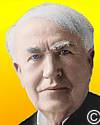 (source)
(source)
|
Thomas Edison
(11 Feb 1847 - 18 Oct 1931)
American inventor who was known internationally as “the Wizard of Menlo Park,” for the huge number of innovations coming from there, the world's first industrial research laboratory.
|
Thomas Edison Quotes on Invention (16 quotes)
>> Click for 62 Science Quotes by Thomas Edison
>> Click for Thomas Edison Quotes on | Experiment | Genius | Phonograph | Thinking |
>> Click for 62 Science Quotes by Thomas Edison
>> Click for Thomas Edison Quotes on | Experiment | Genius | Phonograph | Thinking |
[A] quality of an inventor is imagination, because invention is a leap of the imagination from what is known to what has never been before.
— Thomas Edison
As quoted in French Strother, 'The Modern Profession of Inventing', World's Work and Play (Jul 1905), 6, No. 32, 187.
A minor invention every ten days, and a big one every six months or so.
— Thomas Edison
Expressing his production goals his new laboratory.
I find out what the world needs, then I proceed to invent. My main purpose in life is to make money so that I can afford to go on creating more inventions.
— Thomas Edison
…...
I never did anything worth doing entirely by accident and none of my inventions came about totally by accident. They came about by hard work.
— Thomas Edison
…...
I never pick up an item without thinking of how I might improve it. I never perfected an invention that I did not think about in terms of the service it might give others. I want to save and advance human life, not destroy it. I am proud of the fact that I never invented weapons to kill. The dove is my emblem.
— Thomas Edison
…...
I told [Kruesi] I was going to record talking, and then have the machine talk back. He thought it absurd. However, it was finished, the foil was put on; I then shouted “Mary had a little lamb,” etc. I adjusted the reproducer, and the machine reproduced it perfectly.
On first words spoken on a phonograph.
On first words spoken on a phonograph.
— Thomas Edison
Byron M. Vanderbilt, Thomas Edison, Chemist (1971), 99.
I was always afraid of things that worked the first time. Long experience proved that there were great drawbacks found generally before they could be got commercial; but here was something there was no doubt of.
[Recalling astonishment when his tin-foil cylinder phonograph first played back his voice recording of “Mary had a little lamb.”]
[Recalling astonishment when his tin-foil cylinder phonograph first played back his voice recording of “Mary had a little lamb.”]
— Thomas Edison
Quoted in Frank Lewis Dyer, Thomas Commerford Martin, Edison: His Life and Inventions (1910), 208.
In working out an invention, the most important quality is persistence. Nearly every man who develops an idea works it up to the point where it looks impossible, and then he gets discouraged. That’s not the place to become discouraged, that's the place to get interested.
— Thomas Edison
As quoted in French Strother, 'The Modern Profession of Inventing', World's Work and Play (Jul 1905), 6, No. 32, 186.
It has been just so in all my inventions. The first step is an intuition—and comes with a burst, then difficulties arise. This thing that gives out and then that—“Bugs” as such little faults and difficulties are called show themselves and months of anxious watching, study and labor are requisite before commercial success—or failure—is certainly reached.
— Thomas Edison
Describing his invention of a storage battery that involved 10,296 experiments. Note Edison’s use of the term “Bug” in the engineering research field for a mechanical defect greatly predates the use of the term as applied by Admiral Grace Murray Hopper to a computing defect upon finding a moth in the electronic mainframe.] Letter to Theodore Puskas (18 Nov 1878). In The Yale Book of Quotations (2006), 226.
It usually takes me from five to seven years to perfect a thing. Some things I have been working on for twenty-five years—and some of them are still unsolved. My average would be about seven years. The incandescent light was the hardest one of all: it took many years not only of concentrated thought but also of world-wide research. The storage battery took eight years. It took even longer to perfect the phonograph.
— Thomas Edison
As quoted from an interview by B.C. Forbes in The American Magazine (Jan 1921), 86.
Many inventions are not suitable for the people at large because of their carelessness. Before a thing can be marketed to the masses, it must be made practically fool-proof. Its operation must be made extremely simple. That is one reason, I think, why the phonograph has been so universally adopted. Even a child can operate it. … Another reason is that people are far more willing to pay for being amused than for anything else.
— Thomas Edison
As quoted from an interview by B.C. Forbes in The American Magazine (Jan 1921), 86.
Mary had a little lamb, whose fleece was white as snow!
— Thomas Edison
(1877) The first words he reproduced from his phonograph.
Most inventors who have an idea never stop to think whether their invention will be saleable when they get it made. Unless a man has plenty of money to throw away, he will find that making inventions is about the costliest amusement he can find.
— Thomas Edison
As quoted in French Strother, 'The Modern Profession of Inventing', World's Work and Play (Jul 1905), 6, No. 32, 186.
Of all my inventions, I liked the phonograph best. Life’s most soothing things are sweet music and a child’s goodnight.
— Thomas Edison
…...
The point in which I am different from most inventors is that I have, besides the usual inventor’s make-up, the bump of practicality as a sort of appendix, the sense of the business, money value of an invention. Oh, no, I didn’t have it naturally. It was pounded into me by some pretty hard knocks.
— Thomas Edison
As quoted in French Strother, 'The Modern Profession of Inventing', World's Work and Play (Jul 1905), 6, No. 32, 186.
Which do I consider my greatest invention? … I like the phonograph best … because I love music. And then it has brought so much joy into millions of homes all over this country, and, indeed, all over the world.
— Thomas Edison
As quoted from an interview by B.C. Forbes in The American Magazine (Jan 1921), 86.
See also:
- 11 Feb - short biography, births, deaths and events on date of Edison's birth.
- Thomas Edison Quote “Mary Had A Little Lamb” - Illustrated quote with Tinfoil Phonograph - Large 800 x 600px
- The Talking Phonograph - Thomas Edison's invention of his tinfoil phonograph - article in Scientific American (22 Dec 1877) - with illustrated quote, medium 500px.
- Thomas Edison Quote “Something there was no doubt of” - Illustrated quote + tinfoil phonograph engraving 800px
- Edison Fears Hidden Perils of the X-Rays - from New York World (3 Aug 1903).
- Thomas Edison - context of quote “Genius is not inspired. Inspiration is perspiration.” - Medium image (500 x 350 px)
- Thomas Edison - context of quote “Genius is not inspired. Inspiration is perspiration.” - Large image (800 x 600 px)
- First Thomas Edison Lamp Factory - from Edisonia (1904)
- Thomas Edison Quote “Something there was no doubt of” - Illustrated quote + tinfoil phonograph engraving 500px
- Thomas Edison Quote “Mary Had A Little Lamb” - Illustrated quote with Tinfoil Phonograph - Medium 500 x 350px
- 1 Oct - short biography, births, deaths and events on date of opening of Edison's Menlo Park lamp factory.
- Edison: A Biography, by Matthew Josephson. - book suggestion.
- Booklist for Thomas Edison.
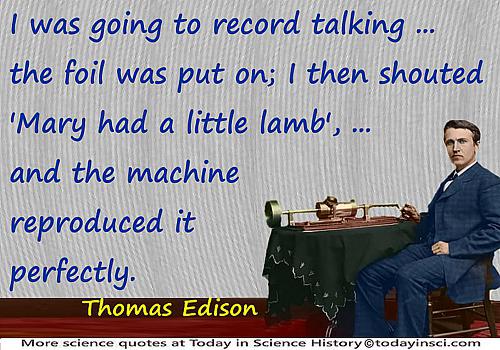
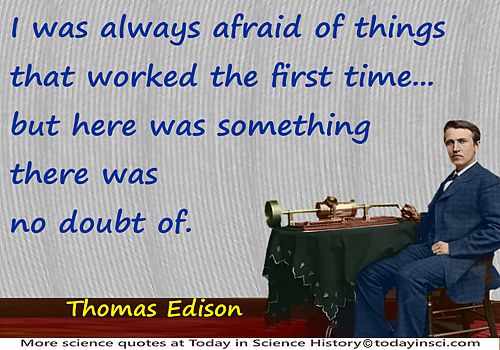
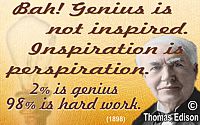
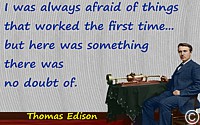
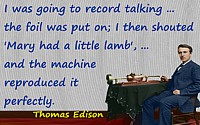
 In science it often happens that scientists say, 'You know that's a really good argument; my position is mistaken,' and then they would actually change their minds and you never hear that old view from them again. They really do it. It doesn't happen as often as it should, because scientists are human and change is sometimes painful. But it happens every day. I cannot recall the last time something like that happened in politics or religion.
(1987) --
In science it often happens that scientists say, 'You know that's a really good argument; my position is mistaken,' and then they would actually change their minds and you never hear that old view from them again. They really do it. It doesn't happen as often as it should, because scientists are human and change is sometimes painful. But it happens every day. I cannot recall the last time something like that happened in politics or religion.
(1987) -- 


